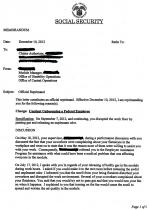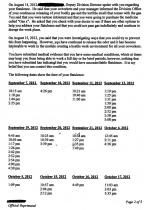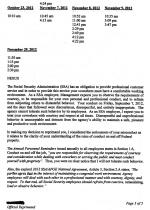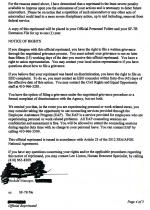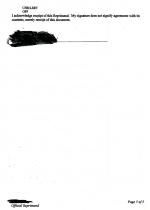Formal Reprimand Issued To Flatulent Federal Worker
Man's gas blamed for creating "intolerable" workplace

View Document
1/11 UPDATE: Feds withdraw reprimand letter dealt to flautulent employee
DECEMBER 21--A federal employee was formally reprimanded this month for excessive workplace flatulence, a sanction that was delivered to him in a five-page letter that actually included a log of representative dates and times when he was recorded “releasing the awful and unpleasant odor” in his Baltimore office.
In a December 10 letter accusing him of “conduct unbecoming a federal officer,” the Social Security Administration employee was informed that  his “uncontrollable flatulence” had created an “intolerable” and “hostile” environment for coworkers, several of whom have lodged complaints with supervisors.
his “uncontrollable flatulence” had created an “intolerable” and “hostile” environment for coworkers, several of whom have lodged complaints with supervisors.
The worker, a 38-year-old Maryland resident, reportedly provided evidence that he suffered from “some medical conditions” that, at times, caused him to be unable to work full days. But a SSA manager noted in the reprimand letter that, “nothing that you have submitted has indicated that you would have uncontrollable flatulence. It is my belief that you can control this condition.”
A redacted copy of the letter was recently circulated among officers of the American Federation of Government Employees (AFGE), the union that represents the SSA worker. Contacted today at his office, the employee said, “I can’t talk to you about this, I’m sorry.” The employee is being represented in connection with the reprimand by a lawyer for his union, AFGE Local 1923. Cynthia Ennis, president of the Baltimore-based local, did not respond to e-mail and phone messages about the matter.
The SSA worker is pictured with his wife in the above photo, which apparently was taken at an amusement park (yes, he is standing at the left shoulder of someone dressed as Pepe Le Pew). The employee is a claims authorizer at the SSA center that handles disability cases for the entire country.
According to the letter of reprimand--which is the least severe administrative sanction that can be levied against a federal worker--the man was first spoken to about his flatulence during a May 18 “performance discussion” with his supervisor. He was informed that fellow employees had complained about his flatulence, and that it was “the reason none of them were willing to assist you with your work.” The supervisor referred the employee to a SSA unit for “assistance with what could have been a medical problem that was affecting everyone in the module.”
Two months later, on July 17, a second SSA manager spoke with the man “in regards of your releasing of bodily gas in the module during work hours.” The manager asked the employee if he could “make it to the restroom before releasing the awful and unpleasant odor.” She also  recounted what appeared to be a prior conversation during which the worker suggested that he would “turn your fan on when it happens.” The manager recalled advising him that, “turning on the fan would cause the smell to spread and worsen the air quality in the module.”
recounted what appeared to be a prior conversation during which the worker suggested that he would “turn your fan on when it happens.” The manager recalled advising him that, “turning on the fan would cause the smell to spread and worsen the air quality in the module.”
On August 14, a third administrator--a SSA “Deputy Division Director”--spoke with the worker about his “continuous releasing of your bodily gas and the terrible smell that comes with the gas.” The manager noted that the worker had said he was lactose intolerant and planned to purchase Gas-X, an over-the-counter remedy. The manager informed the employee that he “could not pass gas indefinitely and continue to disrupt the work place.”
Despite these repeated warnings, the man apparently continued to struggle with his flatulence throughout the late-summer and fall.
After stating that, “It is my belief that you can control this condition,” the author of the reprimand letter then noted, “The following dates show the time of your flatulence.” What followed was a log listing 17 separate dates (and 60 specific times) on which the employee passed gas. For example, the man’s September 19 output included nine instances of flatulence, beginning at 9:45 AM and concluding at 4:30 PM.
The man was also accused of launching a trio of attacks on September 11.
The reprimand letter does not reveal how the worker’s flatulence was memorialized, nor whether that unfortunate task fell to labor or management.
The letter’s author wrote that the employee’s conduct had been “discourteous, disrespectful, and entirely inappropriate,” and was worthy of a formal sanction, which is placed in a worker’s personnel files for up to one year. The reprimand, the manager noted, “is the least severe penalty available to impress upon you the seriousness of your actions and is necessary to deter future misconduct.” (5 pages)

